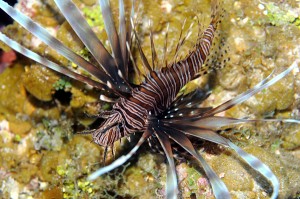Lionfish decreasing
Story published by the Jamaican Observer
NEARLY four years after starting a campaign to control the lionfish population in Jamaican waters, local marine biologists are reporting a reduction in the numbers of the invasive and venomous species.
The species is believed to have entered Caribbean waters from a protected environment in the United States after a natural disaster in 1992. By 2006, experts say, they could be found on almost every reef in Jamaica. Their population can be as high as 250 lionfish/hectare — a situation which has been threatening smaller marine fish, shrimp, crabs, and other crustaceans on which they prey, the livelihood of fisherfolk, the island’s fish exports, and humans as well as the lionfish’s stings are poisonous.
“In-water monitoring has shown a reduction in the numbers of lionfish at key locations around the island. We have also seen good results from the catch data from the fishermen, as they have reported a reduction in the lionfish catch,” said Dr Dayne Buddo of the University of the West Indies’ Discovery Bay Marine Lab (UWI-DBML).
Buddo and his team recently took their campaign — The National Lionfish Project — to Negril and conducted a management training session and removal dive at Sandals Negril Beach Resort and Spa.
Among the areas covered were the features of the lionfish, ways of handling it safely and how to treat an injury inflicted by it. The dive itself focused on ways to safely capture the lionfish and remove the poisonous fins using proper gloves and shears.
“We removed over 20 lionfish from waters surrounding Negril and this is a huge achievement for our first dive,” said Sandals Negril’s Watersports Manager Audley Birthwright.
That was significant, Buddo said, “because two years ago the same dive would have come up with 40 or 50 lionfish. That, in itself, shows a reduction.”
“Removing 20 lionfish on a single dive equates to saving approximately 300,000 juvenile fish over a one-year period,” he remarked, pointing out that one lionfish is capable of eating 20 juvenile fish in one feeding event, and they normally feed twice per day.
Buddo told Environment Watch that though the numbers are falling, it is too early to tell if it has been having any impact on our native fish.
“We won’t see the positives just yet… but the long-term implication is that our native fish will get the opportunity to grow to maturity and reproduce. It has implications for our fisheries too because the lionfish does eat our snappers, our small groupers, surgeonfishes, grunts, parrotfishes, jacks, and other species both commercially and ecologically important to the Jamaican fisheries sector,” he said.
The marine biologist said the fall off in the numbers was a direct result of the intensification of removal strategies and the public education campaign encouraging fishermen and the wider population to catch, sell and eat lionfish.
Despite the success to date, however, Buddo is warning against complacency as the species is resilient and if sufficient pressure isn’t applied to keep it in check, it will rebound.
With the training, the Sandals employees are planning to train others in the Negril community.
“What we want to do is to help raise awareness. In so doing, we will be supporting the efforts of the National Lionfish Project by going out into the communities and helping to train persons on safe handling techniques and educating them on the role they too can play in lessening the lionfish population,” said Sandals Negril’s Environment, Health and Safety Manager, Denisha Powell.
The National Lionfish Project is part of a larger regional project — Mitigating the Threat of Invasive Alien Species in the Insular Caribbean (MTIASIC) — financed by the Global Environment Facility and the United Nations Environment Programme (UNEP). It seeks to strengthen partnerships among government and non-governmental agencies in Jamaica, as well as to promote regional cooperation. Locally, the project — which is to end in July — is led by the National Environment and Planning Agency and the UWI-DBML.
Other partners in the drive to control lionfish include the Sandals Foundation, Sandals Resorts International, Scotiabank Foundation, Food for the Poor, GEF Small Grants Programme, Montego Bay Marine Park Trust, and the Government of Jamaica, and many other NGOs, including fishermen cooperatives.
Read more: http://www.jamaicaobserver.com/environment/Lionfish-decreasing_13653509#ixzz2MIaZh4H3
